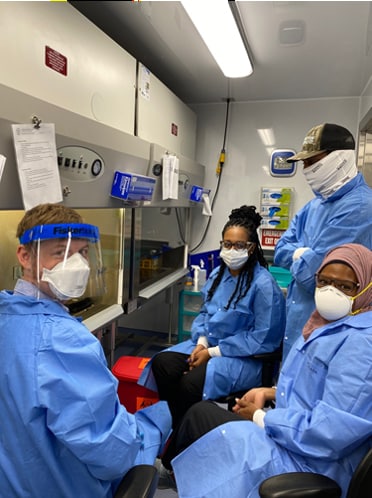Requesting a Lab-Aid
A Lab-Aid is a mechanism for providing rapid, short-term (up to 3 weeks) support to state, territorial, local, tribal, and federal public health labs for critical laboratory testing or operational needs. A Lab-Aid provides on-site or remote technical assistance by trained Laboratory Leadership Service (LLS) fellows and appropriate CDC subject matter experts.
During a Lab-Aid, an LLS fellow takes a leadership role, supported by a CDC subject matter expert, to address an urgent public health concern. A Lab-Aid may involve:
- Conducting lab safety risk assessments
- Advising on lab quality issues or systems to help improve the reliability and reproducibility of lab data
- Standing up or strengthening the lab component of a surveillance program
- Assisting with bioinformatics or advanced molecular detection (AMD) workflows or analyses
- Providing lab expertise or assistance for outbreak investigations
- Capacity building or laboratory operations support
A Lab-Aid team includes at least one LLS fellow and one or more CDC laboratory subject matter experts based on the laboratory’s needs. The Lab-Aid team collaborates closely with the staff of the public health laboratory requesting assistance. The requesting public health laboratory provides overall leadership for the Lab-Aid while the Lab-Aid team provides technical assistance.
A Lab-Aid must be requested by the director of a public health laboratory.
The public health laboratory requesting the Lab-Aid provides overall leadership of the assistance while benefitting from a collaborative relationship with the Lab-Aid team. The public health laboratory generally retains custody and control over all data collected as part of the association. After the Lab-Aid is completed, the public health laboratory can request CDC’s continued collaboration and assistance in data analysis, report writing, presentation preparation, and additional programmatic technical assistance.
- What is a Lab Aid?
- What activities can LLS fellows perform during a Lab-Aid?
- Who participates?
- Who can request a Lab-Aid?
- What is the role of the requesting public health laboratory?
- How can a public health laboratory request a Lab-Aid?
- How do Lab-Aids benefit public health?
- What is the difference between a Lab-Aid and an Epi-Aid?

LLS fellow Stephen LaVoie (Class of 2020), far left, trains staff in a U.S. Virgin Islands public health laboratory on COVID testing instruments.
- The requesting laboratory contacts the LLS program (LLS@cdc.gov) or the subject matter expert at CDC about potential laboratory needs. Requesting laboratories are encouraged to reach out to the LLS program to discuss laboratory needs not listed here.
- The CDC subject matter expert contacts the LLS program (or vice versa) to discuss the Lab-Aid request. Once CDC decides it can support the Lab-Aid, the CDC subject matter expert notifies the requesting laboratory.
- If CDC can support the Lab-Aid, upon notification, the requesting laboratory sends a letter of intent via email to the LLS program at LLS@cdc.gov.
- The LLS program approves the Lab-Aid.
A Lab-Aid benefits public health in several ways. Lab-Aids can
- Streamline access to CDC subject matter experts and laboratory resources
- Increase the technical capacity and workforce available for rapid laboratory response
- Build capacity for laboratory safety and quality through collaboration
- Enhance relationships between CDC and public health laboratories
A Lab-Aid focuses on addressing public health laboratory needs and is not limited to urgent public health responses, such as outbreak investigations.
An Epi-Aid provides rapid, short-term epidemiologic assistance by EIS officers for response to an urgent public health problem. LLS fellows provide laboratory support for some Epi-Aids, as needed.